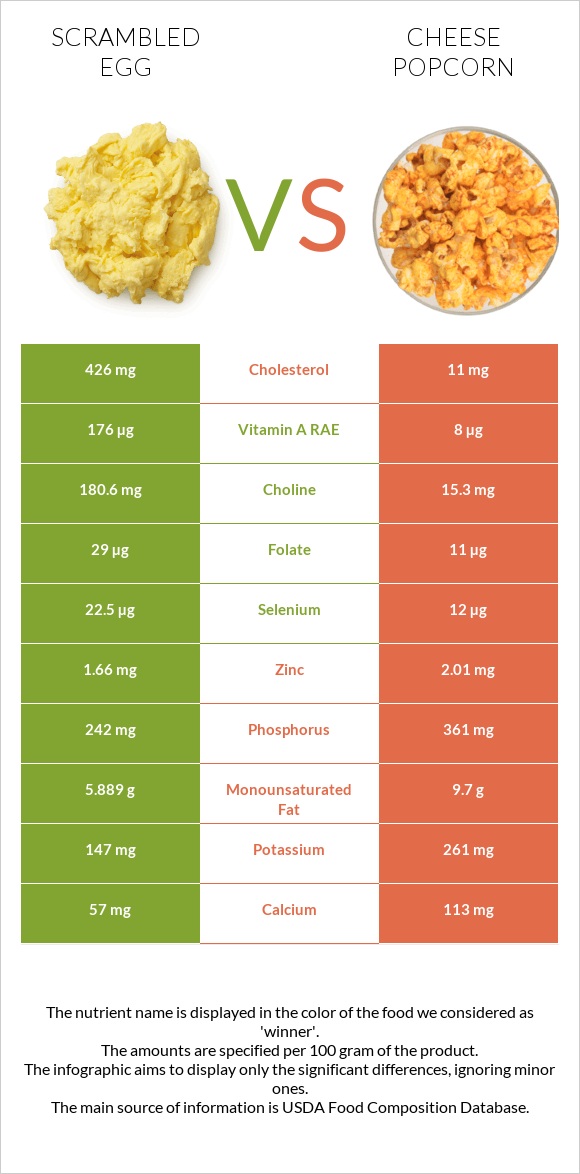Scrambled egg vs. Cheese popcorn — In-Depth Nutrition Comparison
Compare
How are scrambled egg and cheese popcorn different?
- Scrambled egg is richer in choline, vitamin B2, vitamin B12, and selenium, while cheese popcorn is higher in fiber, manganese, vitamin E, and magnesium.
- Scrambled egg covers your daily need for cholesterol, 138% more than cheese popcorn.
- Scrambled egg contains 12 times more choline than cheese popcorn. Scrambled egg contains 180.6mg of choline, while cheese popcorn contains 15.3mg.
- Cheese popcorn is lower in cholesterol.
Fast foods, egg, scrambled and Snacks, popcorn, cheese-flavor types were used in this article.
Infographic

Infographic link
Mineral Comparison
Mineral comparison score is based on the number of minerals by which one or the other food is richer. The "coverage" charts below show how much of the daily needs can be covered by 300 grams of the food.
| Contains more IronIron | +15.6% |
| Contains less SodiumSodium | -79% |
| Contains more SeleniumSelenium | +87.5% |
| Contains more MagnesiumMagnesium | +550% |
| Contains more CalciumCalcium | +98.2% |
| Contains more PotassiumPotassium | +77.6% |
| Contains more CopperCopper | +109% |
| Contains more ZincZinc | +21.1% |
| Contains more PhosphorusPhosphorus | +49.2% |
| Contains more ManganeseManganese | +1558.1% |
Vitamin Comparison
Vitamin comparison score is based on the number of vitamins by which one or the other food is richer. The "coverage" charts below show how much of the daily needs can be covered by 300 grams of the food.
| Contains more Vitamin CVitamin C | +560% |
| Contains more Vitamin AVitamin A | +2100% |
| Contains more Vitamin DVitamin D | +∞% |
| Contains more Vitamin B2Vitamin B2 | +115.8% |
| Contains more Vitamin B5Vitamin B5 | +103.9% |
| Contains more Vitamin B12Vitamin B12 | +90.6% |
| Contains more FolateFolate | +163.6% |
| Contains more Vitamin EVitamin E | +297.9% |
| Contains more Vitamin B1Vitamin B1 | +55% |
| Contains more Vitamin B3Vitamin B3 | +591.9% |
| Contains more Vitamin B6Vitamin B6 | +23.7% |
All nutrients comparison - raw data values
| Nutrient |  |
 |
DV% diff. |
| Cholesterol | 426mg | 11mg | 138% |
| Polyunsaturated fat | 1.969g | 15.37g | 89% |
| Fiber | 0g | 9.9g | 40% |
| Sodium | 187mg | 889mg | 31% |
| Choline | 180.6mg | 15.3mg | 30% |
| Manganese | 0.043mg | 0.713mg | 29% |
| Fats | 16.18g | 33.2g | 26% |
| Vitamin B2 | 0.52mg | 0.241mg | 21% |
| Vitamin B12 | 1.01µg | 0.53µg | 20% |
| Vitamin A | 176µg | 8µg | 19% |
| Vitamin E | 0.96mg | 3.82mg | 19% |
| Selenium | 22.5µg | 12µg | 19% |
| Magnesium | 14mg | 91mg | 18% |
| Carbs | 2.08g | 51.6g | 17% |
| Phosphorus | 242mg | 361mg | 17% |
| Calories | 212kcal | 526kcal | 16% |
| Vitamin B5 | 0.94mg | 0.461mg | 10% |
| Monounsaturated fat | 5.889g | 9.7g | 10% |
| Protein | 13.84g | 9.3g | 9% |
| Copper | 0.067mg | 0.14mg | 8% |
| Vitamin B3 | 0.21mg | 1.453mg | 8% |
| Vitamin D | 46 IU | 0 IU | 6% |
| Calcium | 57mg | 113mg | 6% |
| Vitamin D | 1.1µg | 0µg | 6% |
| Folate | 29µg | 11µg | 5% |
| Iron | 2.59mg | 2.24mg | 4% |
| Vitamin B1 | 0.08mg | 0.124mg | 4% |
| Vitamin C | 3.3mg | 0.5mg | 3% |
| Potassium | 147mg | 261mg | 3% |
| Zinc | 1.66mg | 2.01mg | 3% |
| Vitamin B6 | 0.19mg | 0.235mg | 3% |
| Vitamin K | 9µg | 8.2µg | 1% |
| Saturated fat | 6.153g | 6.41g | 1% |
| Net carbs | 2.08g | 41.7g | N/A |
| Sugar | 1.64g | 0.79g | N/A |
| Tryptophan | 0.212mg | 0.094mg | 0% |
| Threonine | 0.657mg | 0.417mg | 0% |
| Isoleucine | 0.836mg | 0.402mg | 0% |
| Leucine | 1.185mg | 1.024mg | 0% |
| Lysine | 0.913mg | 0.443mg | 0% |
| Methionine | 0.427mg | 0.191mg | 0% |
| Phenylalanine | 0.75mg | 0.405mg | 0% |
| Valine | 0.96mg | 0.489mg | 0% |
| Histidine | 0.325mg | 0.252mg | 0% |
Macronutrient Comparison
Macronutrient breakdown side-by-side comparison
Protein:
13.84 g
Fats:
16.18 g
Carbs:
2.08 g
Water:
66.7 g
Other:
1.2 g
Protein:
9.3 g
Fats:
33.2 g
Carbs:
51.6 g
Water:
2.5 g
Other:
3.4 g
| Contains more ProteinProtein | +48.8% |
| Contains more WaterWater | +2568% |
| Contains more FatsFats | +105.2% |
| Contains more CarbsCarbs | +2380.8% |
| Contains more OtherOther | +183.3% |
Fat Type Comparison
Fat type breakdown side-by-side comparison
Saturated fat:
Sat. Fat
6.153 g
Monounsaturated fat:
Mono. Fat
5.889 g
Polyunsaturated fat:
Poly. Fat
1.969 g
Saturated fat:
Sat. Fat
6.41 g
Monounsaturated fat:
Mono. Fat
9.7 g
Polyunsaturated fat:
Poly. Fat
15.37 g
| Contains more Mono. FatMonounsaturated fat | +64.7% |
| Contains more Poly. FatPolyunsaturated fat | +680.6% |
~equal in
Saturated fat
~6.41g





